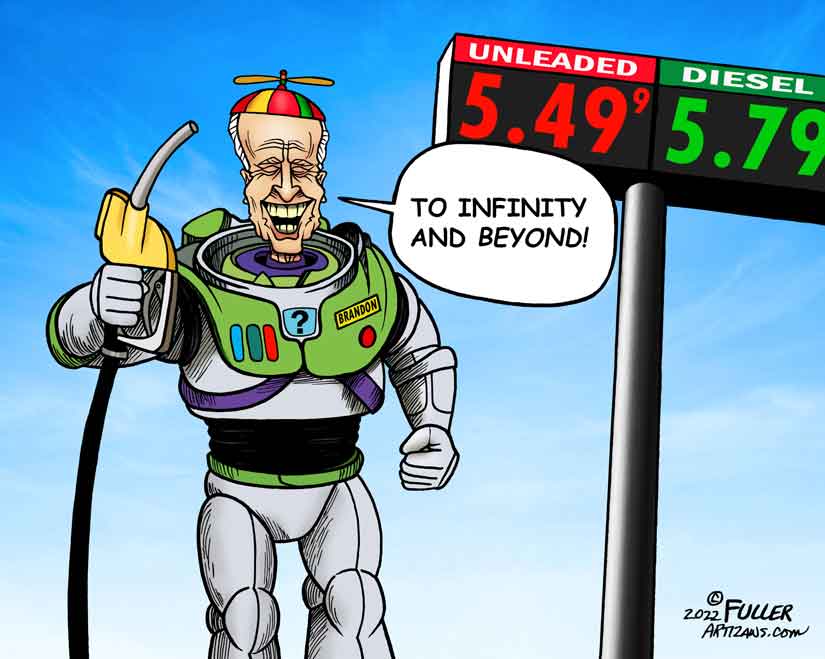
Unlike America's longstanding partisan stalemate - not a single Republican voted for the Inflation Reduction Act that PresidentJoe Biden signed into law on Tuesday - the new conflict over climate policy will pit many environmental groups that have pushed hardest for the United States to decarbonize against the administration's efforts to do so.
The new tussle will inevitably trip up the strategy to overhaul the nation's energy infrastructure, as environmental organizations stand in the way of the most straightforward paths to take carbon out of the American economy over the next 30 years.
"Maybe it was the best they could get, but let's not be disingenuous about the tradeoffs," Brett Hartl, the government affairs director for the Center for Biological Diversity - an environmental advocacy group - told me.
At the moment, what sticks in the craw of green activists are the demands by Senator Joe Manchin in exchange for his vote for the IRA: to clear the path for the completion of a natural gas pipeline across West Virginia, plus a slew of reforms to relax other regulatory hurdles facing energy infrastructure projects, including environmental reviews.
"There is no reason to give Senator Manchin any more concessions than he already got," Sorour told me. "The IRA is going to be transformative," she acknowledged. "Congress approved a massive investment to scale up renewable energy." But as far as Sorour is concerned, giving West Virginia's natural gas a pass is way over the line.
She has a point. Conscripting Congress to approve a favored pipeline is a little unseemly. One hopes America won't go about overhauling its energy infrastructure one pipeline bill at a time. Moreover, it is not unreasonable to demand that pipelines abide by standards to protect the ecosystems and communities they traverse.
But let's face it: Natural gas, which produces just half the carbon emissions of coal, will continue to play a critical role in the decarbonization of the energy grid. "Gas is not a bridge fuel to the clean energy future that we need," Sorour insisted. In fact, it has been the main fuel to replace coal. And it will continue to for some time. Pipelines will be needed to move it around.
Consider North Carolina, one of 16 states that have imposed a schedule of carbon mitigation, committing to slash CO2 emissions by 70% from 2005 to 2030. An analysis by the Brattle Group for the Clean Power Suppliers Association concluded that the cheapest path to the goal included adding 2,000-3,500 megawatts of natural gas-powered generation by then.
Natural gas features in national decarbonization strategies too. The modeling in Princeton's Repeat Project, which calculates the IRA could cut the nation's carbon emissions 42% by 2030, compared to 2005, assumes multibillion dollar investments in additional generation capacity powered by natural gas. The Rhodium Group, which assesses that the legislation could cut emissions from 32% to 42%, also acknowledges that gas-fueled generation will grow.
Getting in the way of natural gas generation, at this stage, will probably just mean burning more coal. "At some point we will approach the end of the 'coal-to-gas' bridge," said Alex Trembath, deputy director of the Breakthrough Institute, which promotes the deployment of technology to confront environmental problems. "But we're not there yet."
The environmental movement's disquiet about the administration's climate strategy is not just due to the carbon emissions from fossil fuels. Hartl points out that the Deepwater Horizon oil rig emitted little CO2 but still managed to do a lot of damage by spilling millions of barrels of oil into the sea.
Indeed, many of America's most powerful green organizations have a broader beef with the impact that any energy infrastructure can have on the natural environment. And that's a problem for the administration's strategy to combat climate change. Every tool in the IRA is likely to run afoul of one environmental goal or another.
The Sierra Club and other groups opposed a now-blocked project to bring hydropower from Canada to the Northeast on the grounds that the needed transmission lines would cut through long swathes of forest, while hydropower takes up substantial acreage and is not renewable anyway.
Projects to capture carbon from the air and store it have also drawn environmentalists' ire. And some environmental groups are apoplectic at the renewed interest in nuclear energy as part of the clean energy mix.
The sun and the wind, for now, seem to be relatively unopposed sources of clean energy. But the Sierra Club has already opposed at least one solar plant in Nevada. Scaling up wind power, which requires 370 times as much land as natural gas-based generation, is definitely going to butt against demands to preserve the natural environment.
The environmental movement's objection to natural gas and other stuff has been of relatively little significance, as the question over what to do about CO2 has been controlled by Republicans' response to it: nothing. But with the GOP's veto over climate policy lifted, greens' opposition to all sorts of things may become the main roadblock to a solution.
The so-called "permitting compromise" between Manchin and Sen. Chuck Schumer, which reportedly has the approval of both Biden and Speaker Nancy Pelosi in the House, will provide the first battleground for this new conflict. Schumer promised Manchin the bill would pass before the close of this fiscal year , which ends on Sept. 30.
But this is hardly the end of the new war over the nation's environmental priorities.
I talked to Phillip K. Howard, the lawyer and good government advocate who wrote "Two Years, Not Ten Years" about how government reviews and regulations have gummed up the deployment of urgently needed infrastructure. I asked whether, ironically, the environmental movement would become a significant obstacle to the nation's efforts toward carbon mitigation. His answer: "Clearly, yes."
Eduardo Porter is a Bloomberg Opinion columnist covering Latin America, U.S. economic policy and immigration. He is the author of "American Poison: How Racial Hostility Destroyed Our Promise" and "The Price of Everything: Finding Method in the Madness of What Things Cost."


 Contact The Editor
Contact The Editor
 Articles By This Author
Articles By This Author